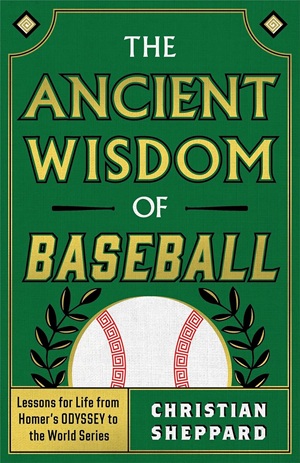Christian Sheppard plays an interesting game with the release of his new book, The Ancient Wisdom of Baseball: Lessons for Life from Homer’s ODYSSEY to the World Series. Simply put, as the title literally would suggest, the book is a self-help manual, but applies such philosophies by way of the most unlikely pairing on its face: Baseball, as any self-respecting Chicagoan, New Yorker, or Bostonian worships at the altar of, and Homer’s Odyssey, a brilliant if somewhat obscure text to cite in a book that has to epitomize issues related to the here and now. Yet Sheppard pulls it off, in the most interesting way possible.
ABOUT THE AUTHOR: https://www.christiansheppard.com/
In a manner similar to psychologist and intellectual Jordan Peterson’s using the framework of mythology to explain current, contextual mores, Sheppard uses mythology both related to Homer’s work – and of other, varied sources – to draw a parallel to one of the most simple, yet simultaneously complex questions one could ever ask themselves. Simply put, How to live.
This is not a straightforward thing to pursue conceptually. In part because how one lives is a dance between one’s own personal patterns as an individual, as it is how much that individual’s identity is a response to, and parallels, their environment. As Sheppard demonstrates, through the modern worship of in his case the Chicago Cubs, and the values held dear in a work as ancient as The Odyssey, there are universal tenets, life lessons, and existential questions not only eerily relevant, but embody current predicaments utterly.
Such a continuity feels, in many ways, ironic. Yet, as Sheppard straightforwardly writes, “For many in modernity, irony is all we have”, before stating: “I was raised Roman Catholic, taught by habit-wearing nuns and collared Jesuits. When I told the priests I was going to the University of Chicago rather than Holy Cross or Boston College, they crossed themselves and shook their heads as though sorry to see another soul lost to Lucifer. In college, just as the priests had feared, I stopped going to Mass. Yet I did go on to graduate school to study religion, to ask about life’s meaning, to answer for myself the questions the Church had once answered for me.” He mentions all of this during a serendipitous moment when he was asked by a stranger about how he was going to raise his daughter, Cecilia. Without missing a beat, Shepherd responded simply, “I’m going to raise her a Cubs fan.”
AMAZON: https://www.amazon.com/ANCIENT-WISDOM-BASEBALL-Lessons-ODYSSEY/dp/B0DHHK19S6
As he subsequently writes, “My questioner crushed her cigarette and turned, withdrawing within the mock-Gothic academy. The large oaken door with its squeaking iron hinges and loud clattering lock swung shut behind her. I gazed down at my daughter, thinking about what I had said. Cecilia smiled up at me. I whispered, ‘Want to go to the ball game?’ She laughed. I nodded. ‘Yes!’” It’s funny how something as simple as deciding to raise one’s daughter a Cubs fan can hold true, existential ramification. Something as simple as rooting for your favorite team is pivotal in defining values, identity, and at large – one’s world. I love how Sheppard is able to make extremely difficult ideas completely understandable, through the most unlikely subject matter on its face to tackle existentialism.
Alexander Marias



























